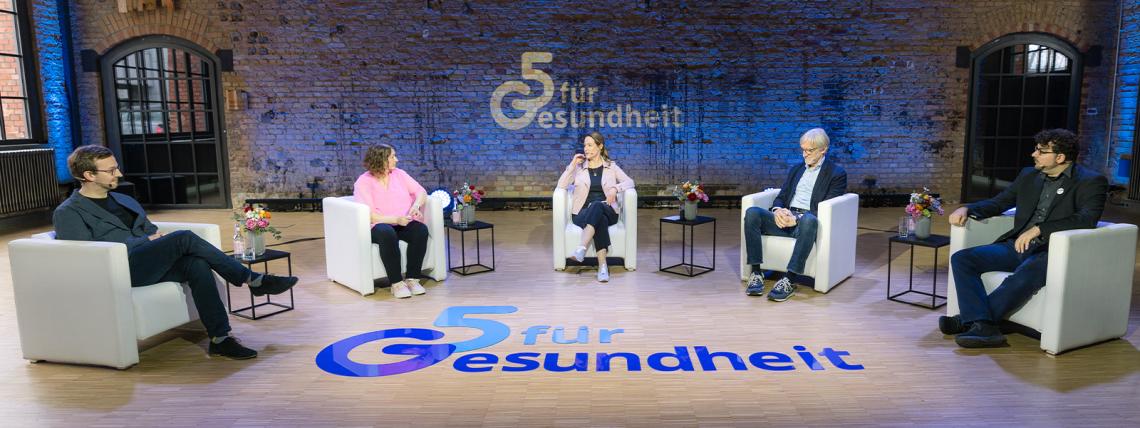AI as a facilitator for patient centricity and cancer patients’ right to be forgotten


AI as a facilitator for patient centricity and cancer patients’ right to be forgotten
AI as a facilitator for patient centricity and cancer patients’ right to be forgotten
We all know someone who has or has had cancer, or we’re even affected ourselves. That's why the topic of cancer and how we can help those affected concerns us all. Another mega-topic of our time is AI, Artificial Intelligence. At “5 for Health”, we therefore discussed these topics together and asked ourselves: What can we achieve together? Experts from patient advocacy, medical and research highlighted that, in addition to significantly accelerating scientific progress, AI is an opportunity to make everyday life easier for doctors, nurses, researchers and patients.
Impulse #1: AI as a chance for patient-centered care – starting with everyday life
Biggi Welter, board member of patient organization mamazone, spoke for many patients when she described her experiences after she got a breast cancer diagnosis: "There is always time pressure at doctors' appointments, and all you want to hear is: Am I going to survive this? All the questions you had are gone. An AI-based tool with relevant, verified information can be a solution to ensure that all patients have access to information.”
The scares are worst at night. “I sat on the couch many nights crying and panicking. And even if everyone says, ‘You can call me any time’ – you don't do that. And certainly not the doctor. Sometimes, when I googled something that comforted me, it got me through the night.” She sees this as another benefit of digital solutions: “They’re available when it suits you best.” She thinks this also has advantages for doctors, as informed patients come to their appointments better prepared. Does she fear that AI could replace doctors? “No. The personal conversation with the doctor will always be the most important thing to a patient.”
Dr. Sebastian Boie, Senior Data Science & Machine Learning Expert at Pfizer, gave an overview of what is currently possible to provide patients with better and more comprehensible information using voice-controlled programs: “There is a lot of potential in these solutions to improve the lives of patients.”

Fotograf: Hanns Schmelzer
Impulse #2: The German Foundation for Young Adults with Cancer – fighting a lifelong stigma
The German Foundation for Young Adults with Cancer fills a huge gap with its services: It is aimed at people between the ages of around 18 and 39 who develop cancer. At this age group, there are about 16,500 new diagnoses in Germany each year – a rather small group, counting for about three percent of all cases. That’s why programs and services for these patients are sparse. “The cure rates for young adults who develop cancer are very high, so for most people at this age, cancer is just an episode in their lives. But it happens at a time when you are building a future,” explains the foundation's speaker, Felix Pawlowski. You want to complete your studies or training, get your first job, start a family, you have financial responsibility for the first time in your life: in short, those affected are eager to shape their future.
That’s why, in addition to the medical questions, those affected have many other questions touching different topics in life. The foundation tries to answer these or to advocate for shaping the environmental political framework for patients so that solutions can be found to the hurdles many of them face in this phase. One of these is the issue of family planning. “Imagine you're sitting in the doctor's surgery and the doctor says: ‘You have cancer.’ Your world comes crashing down. Then the doctor says: ‘We could carry out fertility-preserving measures before we start the cancer treatment.’ This has a tremendous psychological effect: You realize: My doctor assumes that I will survive this potentially fatal disease. They’re asking me to think about the future.” A hugely encouraging moment which can collapse in the next minute when you find out how high the costs of fertility preservation measures are. Especially as the money has to be raised in a very short time in order to be able to start cancer treatment as quickly as possible.
“That's why, in 2017, we started campaigning in health policy for fertility-preserving measures prior to chemo- or radiation therapy to be covered by health insurance, so that patients would have one less thing to worry about. We were able to achieve this with the support of many other organizations: the corresponding law was passed in 2019.”
Impulse #3: The right to be forgotten and the right to be found
The patient organization is currently fighting for the implementation of another right that many European countries have already successfully implemented – but which is not yet available to cancer patients in Germany: the right to be forgotten. Felix Pawlowski made clear that Germany needs to catch up. “The stigmatization caused by cancer has an impact on a person's entire future life, and for young adults we are talking about three, four or more decades. This affects, for example, getting insurance, loan approvals, becoming a civil servant and even the possibility of adopting a child. This is very dramatic for those affected: they are faced with the challenge of having a completely normal life ahead of them, but without the same level of participation. Nobody gets disability insurance after cancer – but which 25-year-old already has one?”
The EU-initiative “Right to be forgotten” is campaigning to ensure that, after a certain period of time, insurers can no longer use a former cancer diagnosis as a criterion to disadvantage a person, for example by charging higher premiums or rejecting applications.
Prof. Dr. Christof von Kalle, BIH Chair for Clinical Translational Sciences and Director of the Clinical Study Center, reminded the audience that, in addition to the important right to be forgotten, there must also be a right to be found: Patients have varying degrees of access to information, which can be crucial to their health. Which information is available to whom depends on many factors: Place of residence, education, income, but also networks and advice from third parties. According to Prof. von Kalle, it is crucial that “information about a specific therapy, for example, reaches patients regardless of where they are or what access they have to the healthcare system”. The focus should therefore not only be on saying no to the use of data, as is currently the case. It should also be possible to choose very easily at any time that data can be used for patients to be found if it gives them the chance to benefit from medical progress.
Prof. von Kalle: “We shouldn't just talk about data protection, but about patient protection. When we ask patients how they feel about data use, we get predominantly positive responses. People who are terminally ill are not afraid of data loss. These people know what they are talking about and we should involve them constructively and creatively in the development processes.”
You can watch the entire panel discussion here